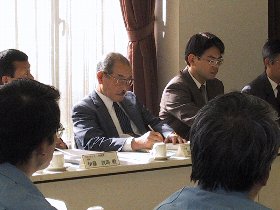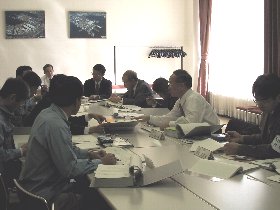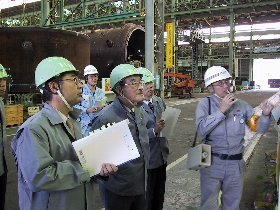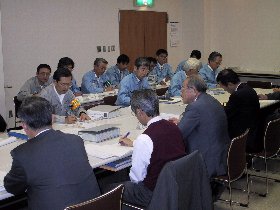|
|
 |
 During the period from October 30 to November 1, 2002, the 26th peer review was carried out at the Headquarters Representative's Office, Yokohama District, Ishikawajima-Harima Heavy Industries Co., Ltd., (Yokohama-shi, Kanagawa Prefecture). In the peer review, Dr. Kuroda, Director of Japan Institute of Human Factors Co., Ltd., a lifestyle information critic from outside NSnet membership, participated as an observer over a period of two days. We would like to introduce his opinions and impressions, which we have compiled below. During the period from October 30 to November 1, 2002, the 26th peer review was carried out at the Headquarters Representative's Office, Yokohama District, Ishikawajima-Harima Heavy Industries Co., Ltd., (Yokohama-shi, Kanagawa Prefecture). In the peer review, Dr. Kuroda, Director of Japan Institute of Human Factors Co., Ltd., a lifestyle information critic from outside NSnet membership, participated as an observer over a period of two days. We would like to introduce his opinions and impressions, which we have compiled below.
 The purport of introducing the observer this time and the contents of the observer evaluation (perspectives) have been indicated separately. The purport of introducing the observer this time and the contents of the observer evaluation (perspectives) have been indicated separately.
|
1. Introduction

|
 I have participated as an observer from outside the company and have been involved with nuclear power through Human Factors since the Three Mile Island incident. I am also a participant of the Advisory Group for the MONJU project. I have participated as an observer from outside the company and have been involved with nuclear power through Human Factors since the Three Mile Island incident. I am also a participant of the Advisory Group for the MONJU project.

|
2. Impressions regarding this peer review

|

Observer confirming openings
(center)
|
 Even though the concept of peer review is not one familiar to Japan, this is the 26th peer review. This is the result of NSnet's great efforts. Even though the concept of peer review is not one familiar to Japan, this is the 26th peer review. This is the result of NSnet's great efforts.
 What I wanted to see most was how NSnet conducted the peer review. For this review in particular, various nuclear-related issues have surfaced, and currently the nuclear power field is facing severely unfavorable conditions. Undertaking this peer review at this key stage when the field must be revitalized or decline, was of great significance. From the host's side (the organization receiving the review) and the reviewer's side, I hoped to see a mutual exchange of ideas regarding where to look for revitalization in the future. On this point I felt that opinions were put out into the open in an extremely frank and mutual way. I also think that it was beneficial to have opinions from the side of Ishikawajima-Harima Heavy Industries. What I wanted to see most was how NSnet conducted the peer review. For this review in particular, various nuclear-related issues have surfaced, and currently the nuclear power field is facing severely unfavorable conditions. Undertaking this peer review at this key stage when the field must be revitalized or decline, was of great significance. From the host's side (the organization receiving the review) and the reviewer's side, I hoped to see a mutual exchange of ideas regarding where to look for revitalization in the future. On this point I felt that opinions were put out into the open in an extremely frank and mutual way. I also think that it was beneficial to have opinions from the side of Ishikawajima-Harima Heavy Industries.
 Specifically, regarding the issue of safety culture and ethics, for example, I think it is important that frank discussions be held on what should be done at the site regarding nuclear power safety in the future. However, I think that rather than principles and rules, what is important for peer reviews are discussions about what should be done at the site. Specifically, regarding the issue of safety culture and ethics, for example, I think it is important that frank discussions be held on what should be done at the site regarding nuclear power safety in the future. However, I think that rather than principles and rules, what is important for peer reviews are discussions about what should be done at the site.
 While the peer review had excellent materials prepared for us, I would like NSnet to think about methods in which to conduct peer reviews in an even simpler manner as well. Of course, as mentioned in the discussions, one merit in creating these sorts of materials is that it brings about communication within the company itself, but as a merit, it is one gained from rather hefty materials. I think if things are made as simple as possible, then the excellent results produced by the peer review will continue. I would like to see various ideas continue to be proposed. While the peer review had excellent materials prepared for us, I would like NSnet to think about methods in which to conduct peer reviews in an even simpler manner as well. Of course, as mentioned in the discussions, one merit in creating these sorts of materials is that it brings about communication within the company itself, but as a merit, it is one gained from rather hefty materials. I think if things are made as simple as possible, then the excellent results produced by the peer review will continue. I would like to see various ideas continue to be proposed.
|

Observer confirming situation of document examination (far center)
|
(1) Concerning Quality Control
 Ishikawajima-Harima Heavy Industries has said that, "We are putting an enormous amount of effort into quality control at this plant, which has a history." I thought that there is an extremely excellent quality control system at work here. After the incident at Three Mile Island, a magazine in the U.S. wrote that "a nuclear power station is like a giant Swiss watch", and from that standpoint, one of the missions in nuclear power is quality control from that standpoint in nuclear power. Listening to the approaches today, I felt that quality control (including a feedback system) of information is advancing through IT and broadening. Ishikawajima-Harima Heavy Industries has said that, "We are putting an enormous amount of effort into quality control at this plant, which has a history." I thought that there is an extremely excellent quality control system at work here. After the incident at Three Mile Island, a magazine in the U.S. wrote that "a nuclear power station is like a giant Swiss watch", and from that standpoint, one of the missions in nuclear power is quality control from that standpoint in nuclear power. Listening to the approaches today, I felt that quality control (including a feedback system) of information is advancing through IT and broadening.
(2) Concerning Work Safety
 There is a very excellent work safety system in place. Its excellence comes from the fact that it is a system conducted autonomously by people at the site. Its success is also extraordinary. There is a very excellent work safety system in place. Its excellence comes from the fact that it is a system conducted autonomously by people at the site. Its success is also extraordinary.
 Regarding work disasters, I thought that what happens when all of one's efforts are expended at the site is the training system called "STOP" of DuPont's work safety system of DuPont. STOP stands for Safety Training and Observation Program, and it was talked about today, as "what needed to be done was to turn the workplace into a place for work safety education." I thought that this was in tune with the Observation Program. Ishikawajima-Harima Heavy Industries maintains excellent safety results, and I greatly respect the efforts of people on-site. Regarding work disasters, I thought that what happens when all of one's efforts are expended at the site is the training system called "STOP" of DuPont's work safety system of DuPont. STOP stands for Safety Training and Observation Program, and it was talked about today, as "what needed to be done was to turn the workplace into a place for work safety education." I thought that this was in tune with the Observation Program. Ishikawajima-Harima Heavy Industries maintains excellent safety results, and I greatly respect the efforts of people on-site.
(3) Concerning Education and Training and Technology Dissemination
 For education and training and technology dissemination, people have developed a habit of running off with the words education and training themselves. While it is easy to fall into an illusion of creating education and training structures and that education and training have been accomplished, I think what is most important with education and training is the kinds of results that are achieved. And in that sense, I think that the education structure of Ishikawajima-Harima Heavy Industries is excellent. For education and training and technology dissemination, people have developed a habit of running off with the words education and training themselves. While it is easy to fall into an illusion of creating education and training structures and that education and training have been accomplished, I think what is most important with education and training is the kinds of results that are achieved. And in that sense, I think that the education structure of Ishikawajima-Harima Heavy Industries is excellent.
 I think what is particularly excellent is the list of experts that come up for technology dissemination. How to disseminate the technology of "experts" and "greats", into the flow of technology of the future is important, but it is not considered so important in Japan. From that point, for extremely high technology, what is needed is to increase the high standard as one proof of technical skill. I think it is essential for the dissemination of technology to be left to the experts. I was deeply impressed that Ishikawajima-Harima Heavy Industries pays attention to that point and is creating a structure for dissemination within the system. I think what is particularly excellent is the list of experts that come up for technology dissemination. How to disseminate the technology of "experts" and "greats", into the flow of technology of the future is important, but it is not considered so important in Japan. From that point, for extremely high technology, what is needed is to increase the high standard as one proof of technical skill. I think it is essential for the dissemination of technology to be left to the experts. I was deeply impressed that Ishikawajima-Harima Heavy Industries pays attention to that point and is creating a structure for dissemination within the system.
|
3. Overall Impressions

|
(1) Concerning the Issue of Ethics
 While there is a habit for the words "safety" and "safety culture" to be used often in Japan, "ethics" is another one of those words. I think that this is probably due to the significant changes taking place in approaches to safety. What is being asked for has moved into a different level-from "technological safety or safety within the company" to "safety approaches as a societal issue". At the root, where we are drawing near to solutions on how to solve nuclear power safety issues amidst an extremely harsh environment, I think that things have completely changed for "great longing for a society of safety culture." Given this, I feel that the breadth of meaning of the word "safety" has expanded and the dimension has changed significantly. While there is a habit for the words "safety" and "safety culture" to be used often in Japan, "ethics" is another one of those words. I think that this is probably due to the significant changes taking place in approaches to safety. What is being asked for has moved into a different level-from "technological safety or safety within the company" to "safety approaches as a societal issue". At the root, where we are drawing near to solutions on how to solve nuclear power safety issues amidst an extremely harsh environment, I think that things have completely changed for "great longing for a society of safety culture." Given this, I feel that the breadth of meaning of the word "safety" has expanded and the dimension has changed significantly.
 Since ethics is notably at the root of a country's very spirit, I think it is something that cannot be borrowed. However, for nuclear power and aeronautics as well, there is a tendency to venerate advanced technology as something that has been translated. I think that it is particularly important for Japanese people to expand the issue of ethics within themselves. Perhaps it cannot be done in discussions of ethics in Japan. There are too many Western languages involved. How should an internal reporter, a whistleblower, be handled within Japanese society? I think it is important to have such people, but it is necessary for our culture to think about how to position them. Since ethics is notably at the root of a country's very spirit, I think it is something that cannot be borrowed. However, for nuclear power and aeronautics as well, there is a tendency to venerate advanced technology as something that has been translated. I think that it is particularly important for Japanese people to expand the issue of ethics within themselves. Perhaps it cannot be done in discussions of ethics in Japan. There are too many Western languages involved. How should an internal reporter, a whistleblower, be handled within Japanese society? I think it is important to have such people, but it is necessary for our culture to think about how to position them.
(2) Concerning Quality Control
 The word "hinshitsu [product quality] kanri [control]" comes from "quality control", and I think within the "hin [product]" there is also "nin [people]". Directly translated, it is originally "shitsu kanri". I think "people" quality control in Japan has become lax. I feel a strong sense that various issues are arising from this. Today, looking at this plant, I feel that people are focusing on how to best improve "people quality". The word "hinshitsu [product quality] kanri [control]" comes from "quality control", and I think within the "hin [product]" there is also "nin [people]". Directly translated, it is originally "shitsu kanri". I think "people" quality control in Japan has become lax. I feel a strong sense that various issues are arising from this. Today, looking at this plant, I feel that people are focusing on how to best improve "people quality".
 Safety, quality and production are all completely on the same foundation. I think this is because the system has been built up with people at its foundation. Safety, quality and production are all completely on the same foundation. I think this is because the system has been built up with people at its foundation.
 Given this, I think that you need to give solid support to people in fundamental places for the hardware that supports safety and the people who design it. At that point, when such things are done, "human control and management", must be doubled up on and that is our weakness. I think we must quickly improve this. Given this, I think that you need to give solid support to people in fundamental places for the hardware that supports safety and the people who design it. At that point, when such things are done, "human control and management", must be doubled up on and that is our weakness. I think we must quickly improve this.
(3) Maintenance of Nuclear Power
 Overall, one issue that concerned me is the large operations protection of "specifications standards" to "functional standards", including the recent Core Shroud issue. On August 15, 2002, the Nuclear and Industrial Safety Agency showed interest in shifting to post-maintenance. I felt that up to now few people have focused on scientific evaluations concerning repairs and maintenance. Compared to the issue of reliability evaluations such as for damage tolerance for airplanes, maintenance methods are quite different. While one may not be able to voice such opinions now, I think it reached a point where it has become necessary. Regarding how maintenance should be done, Ishikawajima-Harima Heavy Industries has accumulated data over its long history. This is extremely important data to maintain and streamline .for nuclear power safety in the future, it is extremely important data to maintain and streamline. Given this, I would be grateful for people to have opinions on maintaining, continuing and improving nuclear power safety. With that the reliability of nuclear power in Japan in the future can be increased and trust and peace of mind of society can be gained. Overall, one issue that concerned me is the large operations protection of "specifications standards" to "functional standards", including the recent Core Shroud issue. On August 15, 2002, the Nuclear and Industrial Safety Agency showed interest in shifting to post-maintenance. I felt that up to now few people have focused on scientific evaluations concerning repairs and maintenance. Compared to the issue of reliability evaluations such as for damage tolerance for airplanes, maintenance methods are quite different. While one may not be able to voice such opinions now, I think it reached a point where it has become necessary. Regarding how maintenance should be done, Ishikawajima-Harima Heavy Industries has accumulated data over its long history. This is extremely important data to maintain and streamline .for nuclear power safety in the future, it is extremely important data to maintain and streamline. Given this, I would be grateful for people to have opinions on maintaining, continuing and improving nuclear power safety. With that the reliability of nuclear power in Japan in the future can be increased and trust and peace of mind of society can be gained.
 |

Observer confirming situation of field observation
(center) |

Observers evaluating the review
(front, third person from the left) |
|
4. Participation status of third-party observer (reference)
|
(1) Observer: Dr. Kuroda
Position:
- |
Director of Japan Institute of Human Factors Co., Ltd. |
Main career and posts:
- |
Graduated Hokkaido University, Faculty of Medicine |
- |
Doctor of Medical Science |
- |
Former Commander, Aeromedical Laboratory, Japan Air Self Defense Force |
- |
Chairman, Total Flight Operation System Study Group |
- |
Former Japan Airlines Special Counselor |
- |
Former Professor, School of Human Sciences, Waseda University |
- |
Former Chairman of Study Group on "Systems for Preventing Harmful Effects from Pharmaceutical and Bio-Chemical Products" |
Publications:
- |
Flight Medicine |
- |
Searching for the Human Factors |
- |
Creating a Safe Culture |
Awards:
- |
Aerospace Medical Association Award (1981) |
- |
Japan Industrial Safety and Health Association Outstanding Achievement Award (1991) |
- |
Ministry of Transport Award (1992) |
- |
Japan Aeronautic Association Achievement Award (1996) |
- |
The Order of the Sacred Treasure, Gold Rays with Neck Ribbon (1997) |
- |
Special Award from the Ministry of Land, Infrastructure and Transport (2002) |
(2) Peer review (location)
 26th peer review (Yokohama-shi, Kanagawa Prefecture) 26th peer review (Yokohama-shi, Kanagawa Prefecture)
(3) Participation schedule
 For two days, October 30 and 31, of the review term of October 30 to November 1, 2002 For two days, October 30 and 31, of the review term of October 30 to November 1, 2002
|
Explanation of Terminology
|
- Three Mile Island Incident: On March 28, 1979, an accident occurred at Three Mile Island Unit-2 in the pressurized water reactor (959MW)..
- MONJU: A prototype Fast Breeder Reactor of the Japan Nuclear Cycle Development Institute. A sodium leak accident at the secondary sodium loops occurred on December 8, 1995.
- Advisory Group: A group formed after the incident at MONJU for the advancement of general safety inspections by nuclear fuel cycle development organizations for the purpose of not leaning towards the approach of any one single organization. It is composed of outside experts in not only the nuclear power field but also other fields such as sodium-handling technology, quality assurance, and the social sciences.
- DuPont: A general chemicals company in the U.S. As a manufacturer in the general chemicals industry, it operates on the largest scale in the world.
- Core Shroud: One of the core support structures in the boiling water reactor, it is a cylindrical shaped structure that stores the fuel assembly and control rods that make up the core.
|
|
|







